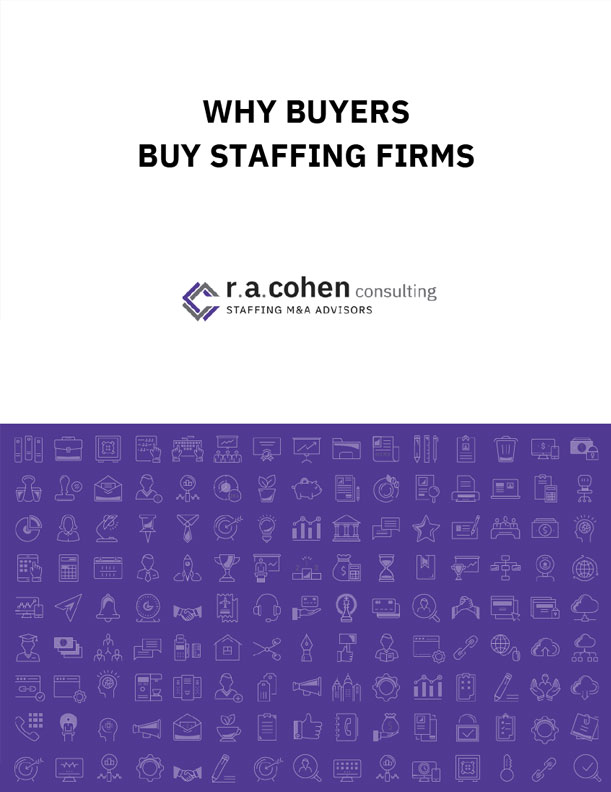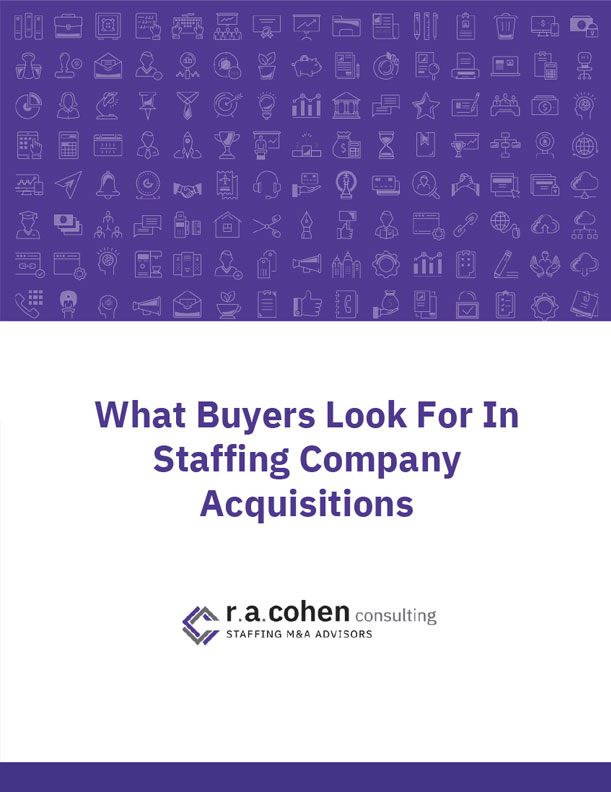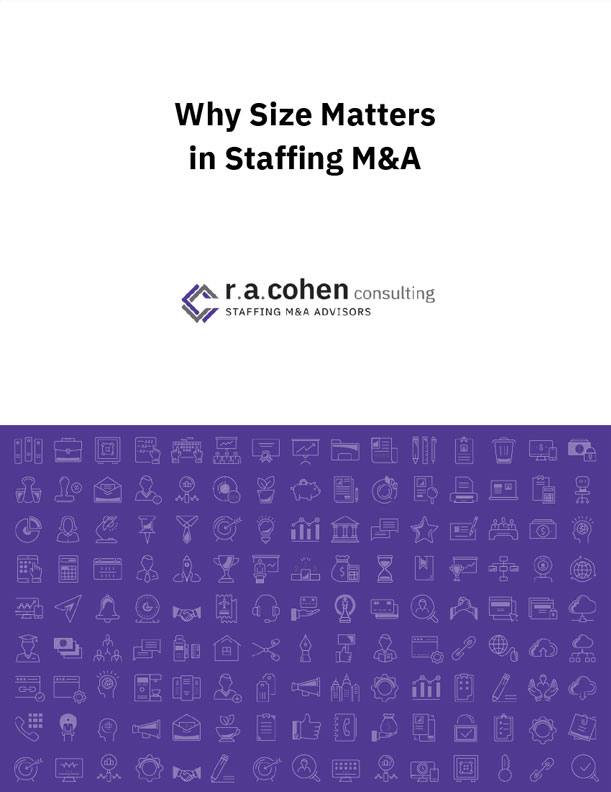Buying a staffing agency involves a process of careful consideration, preparation, and strategic decision-making. It’s an opportunity to expand geographically, diversify services, and grow your client base. The process typically includes preparing well in advance and conducting thorough due diligence to evaluate the target agency’s financial health, operational strengths, and cultural fit.

Buying Considerations for Staffing Agency
Strategic Staffing Company Merger and Acquisition Consulting
At R.A. Cohen Consulting we provide a complete, and strategic consulting service. We are here with you every step of the way. As specialists in the M&A process, we understand all of the potential issues that could occur along the way and we use our extensive industry experience to ensure they don’t become a problem for your transaction.
Our approach will ensure you get the right deal, whether you are buying or selling a business.
Why Business Deals Fail – 12 Deal Breakers
- Unrealistic market valuations. An overpriced business, like a perfectly good but overpriced house, will sit on the market for so long that potential buyers will assume that something is wrong with it.
- Attempting to renegotiate the price or change the terms or meaning of terms after the initial agreement, effectively changing the deal. Be sure that you understand and are comfortable with both the price and the terms of the deal before you agree to them in the first place.
- Professional advisors attempting to function beyond their areas of expertise. Attorneys should protect you on legal aspects, financial advisors should give you tax advice and structure information, and the business advisor intermediary should advise you on the reasonableness of the offer, the terms and structure, etc.
- When a lease is transferred from a seller to a buyer, landlords might see an opportunity for profit. While a small administrative fee ($50 to $200) is reasonable for this transfer, some landlords in certain real estate markets may exploit the situation by demanding excessive fees of $5,000 to $10,000, or an extension of the lease.
- Sellers not keep bankers fully informed, particularly if the bankers are owed money. They want to be sure they will be paid at the time of closing or whenever money changes hands. If the proceeds of the sale are insufficient to repay a bank, the banker will want to know how and when he will get the money owed.
- Buyers looking to steal a business. It’s not worth the time or expense for a seller to try to negotiate with a buyer that makes an unrealistically low offer and will not increase it when appropriate
- Unrealistic projections of future financial performance. Knowledgeable buyers are familiar with market conditions and aware of what reasonable future expectations should be for your business.
- Poor current financial results. One of the most important things knowledgeable M&A advisors do is present the seller’s figures, no matter what they may be currently, in an acceptable and realistic form for the buyer to review. Nothing causes a buyer to lose confidence in a seller faster than inconsistent or unreliable numbers.
- Overly onerous sales, margin, or profit levels required to achieve an earn-out. An unrealistic earn-out offer, whether the seller will be there or not, will affect the total value the seller receives and his ability to compensate senior staff to encourage them to stay and help achieve the objectives.
- Lack of attention to or ambivalence about the transaction. We commonly see this when the buyer’s or seller’s business starts to decline – the person is “away,” doesn’t answer phone calls, etc. It’s usually an indication of a more fundamental problem, resulting in inertia and delays, or the loss of the deal.
- Inexperienced buyers with poor internal communication. Many new buyers – private companies – don’t have targeted M&A departments or business development departments focused on acquisitions. Consequently, the CEO, CFO, and COO all may tend to have their hands in the process, looking at it from different aspects
- Unrealistic adjustments of certain expenses by the seller going forward. Typically, in addition to the cost of sales and SGA expenses, in M&A there’s another section called adjustments. When we’re adjusting earnings, that’s when we see add-backs.
What our clients say about us
Buyers FAQ’s
When buying a staffing agency, several key factors should be carefully considered to ensure a successful acquisition and future growth. These factors include:
- Financial Performance: Examine the agency’s historical and current financial statements, including revenue, profit margins, cash flow, and any outstanding debts. Understanding the financial health of the agency is crucial for assessing its value and potential return on investment.
- Client Base: Evaluate the quality, diversity, and stability of the agency’s client base. A strong, diverse client base suggests a steady flow of business and less risk of revenue loss if a single client departs. Also, assess the length and terms of client contracts.
- Market Position and Competition: Understand the agency’s position in the market compared to its competitors. Assess its market share, reputation, and competitive advantages. Also, consider the market trends and demand for staffing services in the agency’s niche or region.
- Legal and Regulatory Compliance: Ensure the agency complies with all relevant employment laws, industry regulations, and contractual obligations. This includes worker classification, wage laws, and data protection regulations.
- Quality of Staff and Management Team: The quality of the employees and management team is critical. Assess the experience, skills, and performance of the team, as they are integral to the agency’s operations and client relations.
Evaluating the financial health of a staffing agency involves a comprehensive review of various financial documents, metrics, and market factors. Here are key steps to consider:
- Review Financial Statements: Start with the basics by examining the agency’s balance sheet, income statement, and cash flow statement. These documents provide insights into the agency’s assets, liabilities, revenue, expenses, and cash reserves.
- Analyze Profitability: Look at the agency’s net profit margins over time. Consistent or increasing profit margins are usually a good sign, while fluctuating or decreasing margins may require further investigation.
- Assess Revenue Streams: Understand the composition of the agency’s revenue. Is it diversified across multiple clients or reliant on a few major clients? A diverse client base reduces the risk of major revenue loss if one client leaves.
- Examine Cash Flow: Positive cash flow is critical for any business, especially in staffing, where there can be a gap between paying employees and receiving payments from clients. Ensure the agency manages its cash flow effectively.
- Debt Analysis: Evaluate the agency’s debt structure. Excessive debt can be a red flag, but manageable levels of debt may be normal. Consider both the amount of debt and the terms of repayment.
The existing client base of a staffing agency is extremely important in an acquisition, often serving as a key determinant of the agency’s value and future success. Here’s why:
- Revenue Stability: A strong and diversified client base provides a stable source of revenue. Regular, returning clients mean predictable cash flow, which is essential for the day-to-day operations and long-term planning of the business.
- Market Position and Reputation: A well-established client base can be indicative of a good market position and a strong reputation in the industry. It reflects the agency’s ability to maintain client relationships and deliver quality service.
- Growth Potential: A solid client base lays the foundation for growth. It can be leveraged to expand services, cross-sell, or up-sell additional offerings. Additionally, satisfied clients often provide referrals, contributing to organic growth.
- Risk Assessment: Diversification of the client base is crucial. Reliance on a few major clients can pose a significant risk; if one of these clients is lost, it could severely impact revenue. A diversified client base mitigates this risk.
- Contractual Stability: The terms and duration of existing contracts with clients can offer insights into future revenue stability. Long-term contracts suggest a more predictable revenue stream, while a series of short-term or project-based contracts might indicate less stability.
When acquiring a staffing agency, the decision to retain the current staff involves several considerations:
- Expertise and Experience: The existing staff may have valuable industry knowledge, client relationships, and operational expertise. Retaining them could ensure a smooth transition and maintain continuity.
- Cultural Fit: Assess if the current staff’s work culture and values align with your vision for the agency. Cultural mismatches can lead to operational challenges.
- Cost and Efficiency: Evaluate the cost-effectiveness of the existing team. Sometimes, bringing in new staff can be more costly and time-consuming than retaining and training current employees.
- Change Management: A change in ownership can be unsettling. Keeping familiar faces can help ease the transition for both staff and clients.
- Performance Assessment: Conduct a thorough evaluation of each staff member’s performance. This can help you decide who aligns with the agency’s future goals.
Determining a fair valuation for a staffing agency involves several key steps and considerations:
Financial Analysis:
- Revenue and Profit Trends: Examine the agency’s past and current revenues, profit margins, and growth trends.
- Cash Flow Analysis: Assess the agency’s cash flow, including its stability and predictability.
- Debt and Liabilities: Review any debts or liabilities that the agency holds.
Asset Valuation:
- Physical Assets: Evaluate the value of physical assets such as office space, equipment, and technology.
- Intangible Assets: Consider the value of intangible assets like client lists, brand reputation, and intellectual property.
Market Analysis:
- Industry Trends: Understand the staffing industry’s current trends, growth potential, and risks.
- Competitive Positioning: Assess the agency’s position in the market compared to its competitors.
Client and Employee Factors:
- Client Relationships: Evaluate the strength, diversity, and longevity of client relationships.
- Employee Talent: Consider the quality and stability of the agency’s workforce, including leadership.
Earnings Multiplier:
- Apply an earnings multiplier based on industry standards and the agency’s financial health. This involves multiplying the agency’s earnings before interest, taxes, depreciation, and amortization (EBITDA) by an industry-specific multiplier.
Buyer Motivations
Register your Buying Preference With us
Privacy Policy: All business information you provide to us will be kept in strict confidence. The contact information that you provide to us will be used to correspond with you. We will never sell, lease or rent your contact information to a third party. Please complete all fields below.
We look forward to speaking with you.
Sam Sacco
R.A. Cohen Consulting6241 Chalfont Circle
Wilmington, NC, US 28405
Direct: 910.769.4057
Cell: 910.262.5326
Fax: 910.782.2777
Email:sam@racohenconsulting.com
Brian Kennedy CPC
R.A. Cohen Consulting8 Pine Avenue North
Mississauga, ON, CA L5H 2P8
Direct: 416.229.6462
Fax: 416.222.0177
Email:brian@racohenconsulting.com
Mark Zacha CPC
R.A. Cohen Consulting11560 Caminito Gusto,
San Diego, CA. 92131
Mobile: 616.318.7979
Email:mark@racohenconsulting.com
LinkedIn : markzacha




